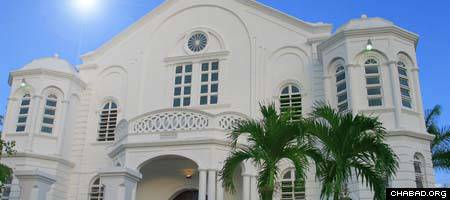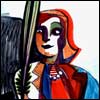For as long as anybody can remember, Jewish Jamaicans have never had a real set of the Four Species, otherwise known as a lulav and etrog, during Sukkot. The island has few date palms and no willows, let alone no etrogs and a strict import policy when it comes to produce. Despite holding on to a vestige of the Sukkot necessities, when it came to the real thing, the community of some 200 has always done without.
Until this year.
Thanks to Alon Gildoni, a 23-year-old Jewish Agency volunteer stationed in Jamaica, and some high-level negotiations between Chabad-Lubavitch officials and the country's agriculture ministry, the island's Jewish community was able – for the first time in modern history – to celebrate Sukkot with a kosher lulav and etrog.
"It was a miracle of sorts," Gildoni — who arrived in November to strengthen the Jewish community — said of the Sept. 26 delivery, which saw an unprecedented grant of a special agricultural import permit the day of the Four Species' arrival, followed by an 11th hour human courier from Miami.
When all was said and done, the precious cargo came just in time for the start of the week-long holiday.
Daily celebrations during Sukkot include a biblically mandated ritual in which Jews hold a date palm branch, myrtle branches, willow twigs and a special citrus known as an 'etrog' together. Jewish teaching sees each variety as representing a different type of person; holding them together symbolizes Jewish unity.
But according to Ainsley Henriques, the 67-year-old former president of Jamaica's only synagogue and the honorary Israeli consul in the capital of Kingston, for much of their history the country's Jews have lived far removed from the Jewish communities and resources of the mainland. Jewish practices survived only through people's memories and improvisations.
The lulav and etrog, therefore, became a branch from a different type of palm tree and cuttings from a tree resembling the myrtle. Lemons took the place of the etrog and the spot for the willow went empty.
"We've always done our own version of things," Henriques said. "During [World War II] we didn't have matzah. We ate wafers from root starches rather than from flour, because we didn't have flour."
Reflecting on the unexpected arrival of the lulav and etrog, Henriques added that "to actually have the real material was a wonderful mitzvah. It was absolutely fabulous."
Gildoni said that the real joy for him came in watching grown men and women get emotional over a ritual that for many across the globe has become routine.
"It exceeded any of my expectations," he said. "It's quite fascinating to see an old person holding the [lulav and etrog] and get really excited with it. People were in tears. They learned for the first time in their lives how meaningful Sukkot is."
Diplomatic Activity

"Once I realized that no one had the real thing, I shared the story with Chabad," related Gildoni. "The problem is, in this country you can't simply import fruit."
Utilizing the popular Ask the Rabbi feature at Chabad.org, which Gildoni had turned to for help with running Rosh Hashanah and Yom Kippur services, he queried about the possibility of obtaining a set of Four Species for Jamaica. In a flurry of pre-holiday activity, the Chabad.org responder who handled the request recognized that the key issue lay in getting a special exemption, and contacted Rabbi Levi Shemtov for diplomatic assistance.
Shemtov, director of American Friends of Lubavitch in Washington, D.C., deals with American and international bureaucracy on behalf of Jewish communities and Chabad-Lubavitch emissaries around the world. He said that his first instinct was to call on some friends he had at the Jamaican Embassy. They put him in touch with agricultural officials in Kingston.
"I spoke to them about the situation and allayed their concerns," said Shemtov. "We agreed that they could send inspectors to the synagogue to see that we weren't importing tainted food of any kind."
The back and forth lasted right up until the flight carrying a non-Jewish messenger named Richard landed at Jamaica's airport. The man had been dispatched by Rabbi Chaim Lipskar, co-director with his wife Deenie of The Shul of Downtown, a bustling Chabad center in the heart of Miami. Despite holiday preparations of his own and a sukkah expected to be full of guests that evening, Lipskar arranged for Richard to spend a day's vacation in Jamaica and transport a set of Four Species belonging to The Shul.
"Rabbi Shemtov called me at 4:30 p.m.," said Lipskar. "And I quickly got a hold of Richard. He called me back 20 minutes later to say that he'd go. The flight to Jamaica left at 5:50 p.m.
"Thank G‑d, everything went smoothly."
Gildoni said that if it wasn't for Lubavitch, the whole plan wouldn't have worked. He said that he was amazed that in a country known for its bureaucratic hassles, he received an import permit the very day that he requested one.
"Next thing I know, this carrier for Chabad knocks on my door, hands me the Four Species, shakes my hand and wishes me and the community a happy Sukkot," said Gildoni.
The community, he added, is "excited about how somebody who didn't know them sent them something just because they were Jewish. The community is really appreciative of the efforts Chabad is doing down here" with the visiting students. But, "I think the lulav and etrog is the peak."
Drop Everything
In reluctantly telling of his own role, Shemtov said: "For a second, I thought to myself that I had so many things to accomplish before the holiday for the Jewish community here."
But he stopped and thought what the reaction would have been from the Lubavitcher Rebbe, Rabbi Menachem Mendel Schneerson, of righteous memory: "I think the Rebbe would have said to drop everything and take care of these Jews first."
The Washington rabbi concluded by lauding the Jamaican government.
"I have nothing but the highest praise for the officials both here and in Jamaica," said Shemtov. "They were supremely accommodating when they realized that it was a community need."
For his part, Henriques saw in Jamaica's first real lulav and etrog another event in a grand Jewish revival on the island.
"We are a congregation steeped in its own traditions, in the longevity, not necessarily the orthodoxy, of our practices," said Henriques. "The outlets to become more observant are not there. There's no shochet, [or kosher butcher], no mikvah. The ability to keep kosher is relatively new, only thanks to new products on the shelves. There's no kosher restaurants.
"But more and more is happening," he continued. "We now have Torah study sessions in small social groups. We received a new Torah from an Israeli who became a Jamaican citizen.
"The arrival of the lulav and etrog from Chabad was yet another platform for us to continue our energies."








Start a Discussion